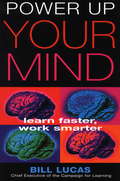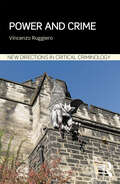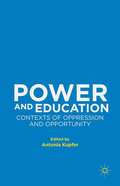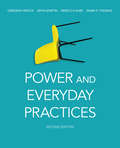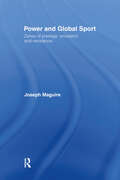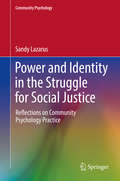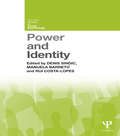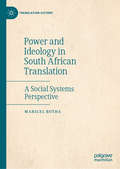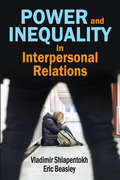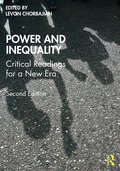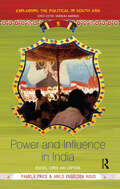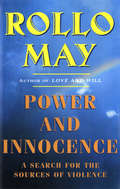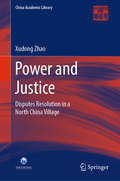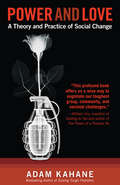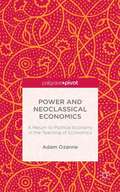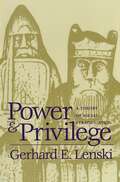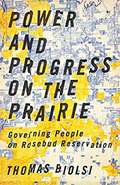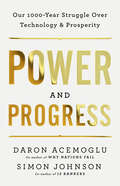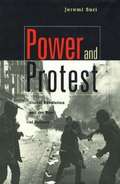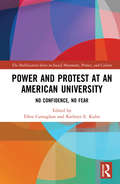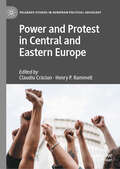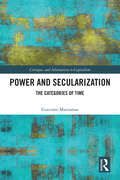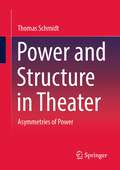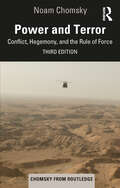- Table View
- List View
Power Up Your Mind: Learn Faster, Work Smarter
by Bill LucasBill Lucas, a leading international expert on life-long learning, shows that while we have learned more about how the brain works in the last decade than we have ever known, only a fraction of this is grasped and applied by most people. Power Up Your Mind applies this practical knowledge for the first time and shows you how to learn. Drawing on research from a wide variety of subject areas, from neuroscience to psychology, from motivation theory to accelerated learning, from memory to diet, this book shows how everyone has the capacity to succeed and how most people use only a very small portion of their talents. For learning to be effective, an understanding of how the brain works is essential and unlike most of the recent thinking on the mind, Lucas connects an understanding of the brain with the reality of the workplace and translates what we know about the brain into useful insights for work. Much work-based training is a waste of time and money because the majority of people are neither emotionally ready nor practically inclined to apply their learning to the way they behave. Power Up Your Mind offers a new model of learning-READY, GO, STEADY-which will revolutionize the way you learn and perform.
Power and Crime (New Directions in Critical Criminology)
by Vincenzo RuggieroThis book provides an analysis of the two concepts of power and crime and posits that criminologists can learn more about these concepts by incorporating ideas from disciplines outside of criminology. Although arguably a 'rendezvous' discipline, Vincenzo Ruggiero argues that criminology can gain much insight from other fields such as the political sciences, ethics, social theory, critical legal studies, economic theory, and classical literature. In this book Ruggiero offers an authoritative synthesis of a range of intellectual conceptions of crime and power, drawing on the works and theories of classical, as well as contemporary thinkers, in the above fields of knowledge, arguing that criminology can ‘humbly’ renounce claims to intellectual independence and adopt notions and perspectives from other disciplines. The theories presented locate the crimes of the powerful in different disciplinary contexts and make the book essential reading for academics and students involved in the study of criminology, sociology, law, politics and philosophy.
Power and Education: Contexts of Oppression and Opportunity
by Antonia KupferEducation is a crucial influence early in life and is therefore inextricably linked with power. This book examines how education can limit opportunities and create social inequality as well as being an empowering force for good. Theoretical approaches on the relationship of power and education are discussed as are questions on power and knowledge.
Power and Everyday Practices, Second Edition
by Rebecca Raby Deborah Brock Aryn Martin Mark P. ThomasThis unique and innovative text provides undergraduate students with tools to think sociologically through the lens of everyday life. Normative social organization and taken-for-granted beliefs and actions are exposed as key mechanisms of power and social inequality in Western societies today. By "unpacking the centre" students are encouraged to turn their social worlds inside out and explore alternatives to the dominant social order. The second edition is divided into three parts. Part one teaches students how to use theory and methodology, which are blended seamlessly throughout the text. It shows how to position Michel Foucault and Karl Marx as companions to theorists such as Stuart Hall, while signalling the importance of non-Western and Indigenous knowledges, experiences, and rights. In part two, students explore—and challenge—normativity in relation to the body, gender and sexuality, race and ethnicity, class, aging, and citizenship. In part three, chapters critique everyday practices such as thinking scientifically, practising self-help, going shopping, managing money, buying coffee, talking about Indigeneity, and travelling as a tourist. Each chapter includes thought-provoking exercises, study questions, and key terms that link to the volume’s comprehensive glossary. Instructors are provided PowerPoint slides, a test bank, and a list of online resources that make the book adaptable to online and blended learning environments.
Power and Global Sport: Zones of Prestige, Emulation and Resistance
by Joseph MaguireSport has changed. Traditions and territorial distinctions are dissolving as a result of new global, political, economic and cultural conditions. The team of authors examine these changes, investigating the power relations that govern the new global sport and assessing the consequences for the future of sport. The book is founded on a series of case studies, linked by a common process-sociological approach, and is divided into four sections - each dealing with an important aspect of sport and globalization: * the local-global nexus - how global sports processes are played out at the level of local communities* lived experiences - the reality of global sport for players and supporters* identity politics - the impact of global sport on national consciousness* sporting futures - the emergent political, economic and cultural forces that are shaping global sport, and their implications for its development. The text introduces new approaches to the study of sport and globalization, updating and extending Maguire's previous work, and is therefore an essential resource for all those working in this fast-changing area.
Power and Identity in the Struggle for Social Justice: Reflections on Community Psychology Practice (Community Psychology)
by Sandy LazarusThis compelling example of auto-ethnography follows the journey of a psychologist pursuing her career in apartheid-era South Africa—and reappraising her work and her worldview in the post-apartheid years. The author describes her development of a human rights perspective, rooted in an understanding of power dynamics in contexts of oppression, privilege and inequality, as it evolved from theory to real-life practice in academia and the community. Key themes include embedding core principles of social justice, and of learning and teaching, in community practice and policy work, and maximizing community action and participation in participatory action research. And in addition to her recommendations for ethical practice and professional development, the author’s self-reflexive presentation models necessary steps for readers to take in building their own careers. Among the topics covered: Self-reflections on power relations in community practice.Learning about the decolonial lens.Empowerment as transformative practice. Policy work during post-apartheid years.Developing teaching and learning theories and practices. Power and Identity in the Struggle for Social Justice will act as both an interesting and a valuable resource for people working or planning to work with people in various community contexts. This includes psychologists who practice community psychology, social workers, and other community practitioners, particularly in social development, health, and education settings.
Power and Identity: Perspectives From The Social Sciences
by Denis Sindic Manuela Barreto Rui Costa-LopesThe concepts of power and identity are vital to many areas of social research. In this edited collection, a prominent set of contributors explore the double relationship between power and group identity, focusing on two complementary lines of enquiry: In what ways can the powerful dictate the identities of the powerless? How can the powerless redefine their identity to challenge the powerful? Each chapter is written by leading authorities in the field, and investigates a particular aspect of the interplay of identity and power via a range of empirical contexts such as colonialism, nationalism, collective action, and electoral politics. The case studies include early modern Goa under Portuguese rule, the tribes of modern-day Jordan, the use of sexual stereotyping and objectification by female activists seeking to transform social systems, and a revisiting of the classic Stanford Prison Experiment. The chapters include contributions from a variety of social disciplines and research methodologies, and together provide a comprehensive overview of a subject at the cutting-edge of social and political psychology. Power and Identity will be of great interest to researchers, graduates and upper-level undergraduate students from across the social sciences.
Power and Ideology in South African Translation: A Social Systems Perspective (Translation History)
by Maricel BothaThis book provides a social interpretation of written South African translation history from the seventeenth century to the present, considering how trends involving various languages have reflected ideologies and unequal power relations and focusing attention on translation’s often hidden social operation. Translation is investigated in relation to colonial mercantilism, scientific knowledge of extraction, Christian missionary conversion, Islamic education, various nationalisms, apartheid oppression and the anti-apartheid struggle, neoliberalism, exclusion and post-apartheid social transformation by employing Niklas Luhmann’s social systems theory. This book will be an essential resource for scholars, graduate students, and general readers who are interested in or work on the history and practice of translation and its cultural agents in the South African context.
Power and Inequality in Interpersonal Relations
by Vladimir Shlapentokh Eric BeasleyThis book explores interpersonal situations in which weak or vulnerable people find themselves and the ways in which others help create, sustain, and eradicate such social dynamics. Vladimir Shlapentokh and Eric Beasley demonstrate that people can gain power over each other and then abuse this power because of unequal resource conditions. The authors define resources as the means necessary for satisfaction or achievement of needs or goals, such as wealth, physical strength, intellectual capacity and information, sexual attractiveness, and status. This volume is different from existing social science books on inequality and vulnerability, which address relations between people of different social positions, races, genders, ages, and places of residence confronting each other in political, economic, and cultural battles. This book focuses on people who become the victims of those whom they know personally-relatives, colleagues, neighbors. The authors argue that unequal resource distribution among members of social units is the main cause of conflict and ultimately creates situations where members of a social unit can abuse other members of the same unit.
Power and Inequality: Critical Readings for a New Era
by Levon ChorbajianSuccessfully bringing together accessible readings that cover the broad range of issues of importance to those studying politics and society, this new edition of Power and Inequality provides a unique mix of theoretical and empirical pieces, such as state and electoral politics, that address both classic issues in political sociology and more recent developments, such as globalization. With strong integration of race and gender throughout, this collection offers a coherent analysis of power that reflects the contributions of a variety of critical perspectives, including Marxism, feminism, critical race theory, postmodernism, and power structure theory.
Power and Influence in India: Bosses, Lords and Captains (Exploring the Political in South Asia)
by Pamela Price Arild Engelsen RuudTaking cognisance of the lack of studies on leadership in modern India, this book explores how leadership is practiced in the Indian context, examining this across varied domains — from rural settings and urban neighbourhoods to political parties and state governments. The importance of individual leaders in the projection of politics in South Asia is evident from how political parties, mobilisation of movements and the media all focus on carefully constructed personalities. Besides, the politically ambitious have considerable room for manoeuvre in the institutional setup of the Indian subcontinent. This book focuses on actors making their political career and/or aspiring for leadership roles, even as it also foregrounds the range of choices open to them in particular contexts. The articles in this volume explore the variety of strategies used by politically engaged actors in trying to acquire (or keep) power — symbolic action, rhetorical usage, moral conviction, building of alliances — illustrating, in the process, both the opportunities and constraints experienced by them. In taking a qualitative approach and tracking both political styles and transactions, this book provides insights into the nature of democracy and the functioning of electoral politics in the subcontinent.
Power and Innocence: A Search for the Sources of Violence
by Rollo MayStressing the positive, creative aspects of power and innocence, Rollo May offers a way of thinking about the problems of contemporary society. Rollo May defines power as the ability to cause or prevent change; innocence, on the other hand, is the conscious divesting of one's power to make it seem a virtuea form of powerlessness that Dr. May sees as particularly American in nature. From these basic concepts he suggests a new ethic that sees power as the basis for both human goodness and evil. Dr. May discusses five levels of power's potential in each of us: the infant's power to be; self-affirmation, the ability to survive with self-esteem; self-assertion, which develops when self-affirmation is blocked; aggression, a reaction to thwarted assertion; and, finally, violence, when reason and persuasion are ineffective.
Power and Justice: Disputes Resolution in a North China Village (China Academic Library)
by Xudong ZhaoThis book discusses the relationship, interaction and conflict between everyday life and various institutions in a specific village in North China, with a focus on the formal and informal legal systems. It vividly describes the village’s “legal construction problems” as well as the customs and laws, and such it can be seen as a historical and innovative comment on China’s problems. The book is based on the author’s field investigations assessing vast amounts of material concerning local organizations, formal and informal authorities, economic exchange, religious rituals, as well as interviews with villagers and numerous court files. It presents an in-depth exploration of “pluralism of authority” in China’s rural society, and examines how various authorities were formed. It also summarizes how various local disputes are resolved and discusses the villagers’ understanding of the concept of “justice.” Lastly, it suggests ways in which national law and local customs could communicate and collaborate.
Power and Love: A Theory and Practice of Social Change
by Adam KahaneA new approach, proven in the field, for making progress on our most important and difficult collective challenges Based on Kahane’s first-hand experiences working with teams of business, government and civil society leaders around the world Profound, personal and practical The two main ways that people try to solve their toughest group, community and societal problems are fundamentally flawed. They either push for what they want at all costs—in it’s most extreme form this means war—or try to completely avoid conflict, sweeping problems under the rug in the name of a superficial ”peace.” But there is a better way: combining these two seemingly contradictory approaches. Adam Kahane argues that each is a reflection of two distinct, fundamental drives: power, the single-minded desire to achieve one’s solitary purpose; and love, the drive towards unity. They are inextricable parts of human nature, so to achieve lasting change you have to able to work fluidly with both. In fact, each needs the other. As Martin Luther King put it, “Power without love is reckless and abusive, and love without power is sentimental and anemic.” Kahane delves deeply in the dual nature of power and love, exploring their complex and intricate interplay. With disarming honesty he relates how, through trial and error, he learned to balance between them, shifting from one to the other as though learning to walk—at first falling, then stumbling forward, and finally moving purposefully toward true, lasting reconciliation and progress. For the last twenty years Kahane has worked around the world on a variety of challenges: economic development, food security, health care, judicial reform, peace making, climate change. He has worked with diverse teams of leaders—executives and politicians, generals and guerillas, civil servants and trade unionists, community activists and United Nations officials, clergy and artists. He has seen, up close and personal, examples of inspiring progress and terrifying regress. Power and Love reports what he has learned from these hard-won experiences.
Power and Neoclassical Economics: A Return to Political Economy in the Teaching of Economics
by Adam OzannePower and Neoclassical Economics.
Power and Privilege
by Gerhard E. LenskiPower and Privilege seeks to answer the central question of the field of social stratification: Who gets what and why? Using a dialectical view of the development of thought in the discipline, Gerhard Lenski describes the outlines of an emerging synthesis of theories. He shows that perspectives as diverse and contradictory as those of Marx, Spencer, Sumner, Veblen, Mosca, Pareto, Sorokin, Parsons, and Dahrendorf are parts of an evolving and systematic body of theory.
Power and Progress on the Prairie: Governing People on Rosebud Reservation
by Thomas BiolsiA critical exploration of how modernity and progress were imposed on the people and land of rural South Dakota The Rosebud Country, comprising four counties in rural South Dakota, was first established as the Rosebud Indian Reservation in 1889 to settle the Sicangu Lakota. During the first two decades of the twentieth century, white homesteaders arrived in the area and became the majority population. Today, the population of Rosebud Country is nearly evenly divided between Indians and whites. In Power and Progress on the Prairie, Thomas Biolsi traces how a variety of governmental actors, including public officials, bureaucrats, and experts in civil society, invented and applied ideas about modernity and progress to the people and the land. Through a series of case studies—programs to settle &“surplus&” Indian lands, to &“civilize&” the Indians, to &“modernize&” white farmers, to find strategic sites for nuclear missile silos, and to extend voting rights to Lakota people—Biolsi examines how these various &“problems&” came into focus for government experts and how remedies were devised and implemented.Drawing on theories of governmentality derived from Michel Foucault, Biolsi challenges the idea that the problems identified by state agents and the solutions they implemented were inevitable or rational. Rather, through fine-grained analysis of the impact of these programs on both the Lakota and white residents, he reveals that their underlying logic was too often arbitrary and devastating.
Power and Progress: Our Thousand-Year Struggle Over Technology and Prosperity
by Simon Johnson Daron AcemogluThe bestselling co-author of Why Nations Fail and the bestselling co-author of 13 Bankers deliver a bold reinterpretation of economics and history that will fundamentally change how you see the world A thousand years of history and contemporary evidence make one thing clear: progress depends on the choices we make about technology. New ways of organizing production and communication can either serve the narrow interests of an elite or become the foundation for widespread prosperity. The wealth generated by technological improvements in agriculture during the European Middle Ages was captured by the nobility and used to build grand cathedrals, while peasants remained on the edge of starvation. The first hundred years of industrialization in England delivered stagnant incomes for working people. And throughout the world today, digital technologies and artificial intelligence undermine jobs and democracy through excessive automation, massive data collection, and intrusive surveillance. It doesn&’t have to be this way. Power and Progress demonstrates the path of technology was once—and may again—be brought under control. Cutting-edge technological advances can become empowering and democratizing tools, but not if all major decisions remain in the hands of a few hubristic tech leaders. With their bold reinterpretation of economics and history, Daron Acemoglu and Simon Johnson fundamentally change how we see the world, providing the vision needed to redirect innovation so it again benefits most people.
Power and Protest
by Jeremi SuriJeremi Suri puts the tumultuous 1960s into a truly international perspective in the first study to examine the connections between great power diplomacy and global social protest.
Power and Protest at an American University: No Confidence, No Fear (The Mobilization Series on Social Movements, Protest, and Culture)
by EllenKathryn Carnaghan E. KuhnThis book examines the successful no-confidence movement led by faculty at Saint Louis University in 2013 in an effort to unseat the university president, considering the reasons for success when similar movements often fail. Through a series of chapters written by faculty from many disciplines at the university, it uses a particular episode of faculty protest to shed light on wider issues concerning the circumstances in which faculty are likely to be motivated to protest, the institutional frameworks that make protest possible and the strategies that get results. As such, it will appeal to scholars of social movements with interests in protest and mobilization in the field of education.
Power and Protest in Central and Eastern Europe (Palgrave Studies in European Political Sociology)
by Claudiu Crăciun Henry P. RammeltThis book offers a detailed overview of the politics of contemporary social movements in Central and Eastern Europe. The analysis of 11 countries reveals the relevance of protest events, social movements, and civil society in shaping democratic transition and consolidation, electoral politics and institutions, socio-economic policies, and geopolitical orientation. This volume shows how power structures and government institutions respond to civic mobilisations and protests, using diverse tactics ranging from co-option to repression and how protests and mobilisations became consequential in the region's politics.
Power and Secularization: The Categories of Time (Critiques and Alternatives to Capitalism)
by Giacomo MarramaoThis book offers a geneaological understanding of the condition of our time by reconstructing the complex story of the transition from the "cyclical time" of the classic era to the "linear and infuturant time" of the modern world. Time is therefore understood not as a simple vector, but as a trans-political form par excellence, which involves the fundamental philosophical and political categories of the modern constellation: beginning with the concepts of progress, revolution, liberation, and alternative.Arguing that the process of secularization (in its broadest sense) is dependent on the modern notion of cumulative and irreversible time—together with the temporalization of history—Power and Secularization constitutes a conceptual history that will appeal to scholars of social and political theory and philosophy with interests in intellectual history and the genealogical method.
Power and Structure in Theater: Asymmetries of Power
by Thomas SchmidtStructure and power are two defining and interrelated aspects of the German theater business. It is based on the strictly hierarchical organization of 1900 and has undergone hardly any structural changes since then. This not only impairs the innovative capacity of this important institution, but also leads to inappropriately strong power positions of the directors, to conflicts with the ensembles and employees, and hinders the development and renewal of the artistic potentials of this cultural technique. The publication is based on the results of the study 'Art and Power in the Theater' - with 1966 participants the largest study of its kind. The contentPower as a decision-making and management tool in the theaterThe connection between power and organizationPower and abuse in the theaterStructural power and forms of power containmentResults of the study The target groupsStudents, teachers and researchers in the fields of cultural management, cultural and theater studies, dramaturgy, psychology, sociology and anthropology,employees of management at the theater and other cultural organizationThe authorThomas Schmidt has been professor and director of the Theater and Orchestra Management program in Frankfurt since 2010. He was managing director of the National Theater Weimar from 2003 to 2013 and visiting professor at Harvard University in 2014.
Power and Terror: Conflict, Hegemony, and the Rule of Force (Chomsky from Routledge)
by Noam ChomskyIn this pertinent book, Noam Chomsky examines the imbalanced dynamics of international power relations and the use of state terror by the United States and other Western powers in the Middle East in the post-9/11 era. This edition features new forewords by Fred Branfman and Chris Hedges reasserting the enduring importance of Chomsky’s work and extending Chomsky’s analysis to recent developments in the Middle East.Chomsky explores international relations since World War II to demonstrate that contemporary acts of terrorism cannot be understood outside the context of Western power and state terror throughout the world, particularly in the Middle East. In doing so, Chomsky demonstrates that state terror is intrinsic to U.S. foreign policy and fundamental in the maintenance of Western hegemony throughout the so-called War on Terror, including throughout the Obama administration.This new edition offers a vital critique of U.S. foreign policy and its reliance on acts of terror to maintain its hegemony in the Middle East. It will therefore be vital reading for those who wish to understand the grim realities of Western foreign policy.
